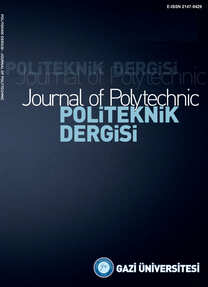Equi-Depth Histogram Construction Methodology for Big Data Tools
Approximate histogram, merging histograms, big data, log files, hadoop distributed file system
Equi-Depth Histogram Construction Methodology for Big Data Tools
approximate histogram, merging histograms, big data, log files, hadoop distributed file system,
___
- B. Yıldız, T. Büyüktanır, and F. Emekci, “Equi-depth histogram construction for big data with quality guarantees,” arXiv preprint arXiv:1606.05633, 2016.
- D. Logothetis, C. Olston, B. Reed, K. C. Webb, and K. Yocum, “Stateful bulk processing for incremental analytics,” in Proceedings of the 1st ACM symposium on Cloud computing. ACM, 2010, pp. 51–62.
- A. Thusoo, Z. Shao, S. Anthony, D. Borthakur, N. Jain, J. Sen Sarma, R. Murthy, and H. Liu, “Data warehousing and analytics infrastructure at facebook,” in Proceedings of the 2010 ACM SIGMOD International Conference on Management of data. ACM, 2010, pp. 1013–1020.
- A. Thusoo, J. S. Sarma, N. Jain, Z. Shao, P. Chakka, N. Zhang, S. Antony, H. Liu, and R. Murthy, “Hive-a petabyte scale data ware- house using hadoop,” in Data Engineering (ICDE), 2010 IEEE 26th International Conference on. IEEE, 2010, pp. 996–1005.
- A. S. Foundation. (2008) Apache hadoop. [Online]. Available: https://hadoop.apache.org/
- J. Dean and S. Ghemawat, “Mapreduce: a flexible data processing tool,” Communications of the ACM, vol. 53, no. 1, pp. 72–77, 2010.
- J. Dittrich, J.-A. Quiané-Ruiz, A. Jindal, Y. Kargin, V. Setty, and J. Schad, “Hadoop++: making a yellow elephant run like a cheetah (without it even noticing),” Proceedings of the VLDB Endowment, vol. 3,no. 1-2, pp. 515–529, 2010.
- A. F. Gates, O. Natkovich, S. Chopra, P. Kamath, S. M. Narayanamurthy, C. Olston, B. Reed, S. Srinivasan, and U. Srivastava, “Building a high-level dataflow system on top of map-reduce: the pig experience,” Proceedings of the VLDB Endowment, vol. 2, no. 2, pp. 1414–1425, 2009.
- A. Jindal, J.-A. Quiané-Ruiz, and J. Dittrich, “Trojan data layouts: right shoes for a running elephant,” in Proceedings of the 2nd ACM Symposium on Cloud Computing. ACM, 2011, p. 21.
- M. Zaharia, A. Konwinski, A. D. Joseph, R. H. Katz, and I. Stoica, “Improving mapreduce performance in heterogeneous environments.” in OSDI, vol. 8, no. 4, 2008, p. 7.
- M. Isard, M. Budiu, Y. Yu, A. Birrell, and D. Fetterly, “Dryad: distributed data-parallel programs from sequential building blocks,” in ACM SIGOPS Operating Systems Review, vol. 41, no. 3. ACM, 2007, pp. 59–72.
- A. Schumacher, L. Pireddu, M. Niemenmaa, A. Kallio, E. Korpelainen, G. Zanetti, and K. Heljanko, “Seqpig: simple and scalable scripting for large sequencing data sets in hadoop,” Bioinformatics, vol. 30, no. 1, pp. 119–120, 2014.
- S. Wu, F. Li, S. Mehrotra, and B. C. Ooi, “Query optimization for massively parallel data processing,” in Proceedings of the 2nd ACM Symposium on Cloud Computing. ACM, 2011, p. 12.
- S. Babu, “Towards automatic optimization of mapreduce programs,” in Proceedings of the 1st ACM symposium on Cloud computing. ACM, 2010, pp. 137–142.
- H. Herodotou and S. Babu, “Profiling, what-if analysis, and cost-based optimization of mapreduce programs,” Proceedings of the VLDB Endowment, vol. 4, no. 11, pp. 1111–1122, 2011.
- E. Jahani, M. J. Cafarella, and C. Ré, “Automatic optimization for mapreduce programs,” Proceedings of the VLDB Endowment, vol. 4, no. 6, pp. 385–396, 2011.
- D. Jiang, B. C. Ooi, L. Shi, and S. Wu, “The performance of mapreduce: An in-depth study,” Proceedings of the VLDB Endowment, vol. 3, no. 1-2, pp. 472–483, 2010.
- J. Dittrich, J.-A. Quiané-Ruiz, S. Richter, S. Schuh, A. Jindal, and J. Schad, “Only aggressive elephants are fast elephants,” Proceedings of the VLDB Endowment, vol. 5, no. 11, pp. 1591–1602, 2012.
- A. Floratou, J. M. Patel, E. J. Shekita, and S. Tata, “Column-oriented storage techniques for mapreduce,” Proceedings of the VLDB Endowment, vol. 4, no. 7, pp. 419–429, 2011.
- Y. Lin, D. Agrawal, C. Chen, B. C. Ooi, and S. Wu, “Llama: leveraging columnar storage for scalable join processing in the mapreduce framework,” in Proceedings of the 2011 ACM SIGMOD International Conference on Management of data. ACM, 2011, pp. 961–972.
- Google search statistics. [Online].Available: http://www.internetlivestats.com/google-search-statistics/
- Yahoo advertising. [Online]. Available: https://advertising.yahoo.com/yahoo-sites/Homepage/index.htm
- Y. Ioannidis, “The history of histograms (abridged),” in Proceedings of the 29th international conference on Very large data bases-Volume 29. VLDB Endowment, 2003, pp. 19–30.
- C. Olston, B. Reed, U. Srivastava, R. Kumar, and A. Tomkins, “Pig latin: a not-so-foreign language for data processing,” in Proceedings of the 2008 ACM SIGMOD international conference on Management of data. ACM, 2008, pp. 1099–1110.
- P. M. Hallam-Baker and B. Behlendorf, “Extended log file format,” WWW Journal, vol. 3, p. W3C, 1996.
- ISSN: 1302-0900
- Yayın Aralığı: 6
- Başlangıç: 1998
- Yayıncı: GAZİ ÜNİVERSİTESİ
Flow and Heat Transfer Characteristics of Inclined Jet Impingement on a Flat Plate
Amir LAK, TAMER ÇALIŞIR, Şenol BAŞKAYA
GPU Programlamada CUDA Platformu Kullanılan Paralel Görüntü İşleme Çalışmalarının İncelenmesi
Semra AYDIN, REFİK SAMET, ÖMER FARUK BAY
Ferhat BİNGÖL, Ali HASSAN, Müfit ALTIN
Yoğurtun İnkübasyonu ve Soğutulması için Yüksek Enerji Verimli Sistem Tasarımı
Rukiye MAVUŞ, Gülşah KARACA, Ekin Can DOLGUN, Mustafa AKTAŞ
Utilization of CFD for the Aerodynamic Analysis of a Subsonic Rocket
Fatma Zeynep AYTAÇ YILMAZ, FATİH AKTAŞ
Sümeyye BAYRAKDAR, İBRAHİM YÜCEDAĞ
Nimonic 80A Alaşımının Johnson-Cook Model Parametrelerinin Sonlu Elemanlar Yöntemiyle Doğrulanması
Mehmet Erdi KORKMAZ, Mustafa GÜNAY
Büyük Veri Araçları için Eş-Derinlikli Histogram Oluşturma Metodolojisi
